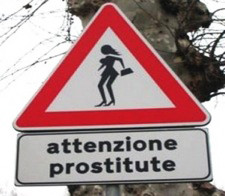No One Volunteers to Be Exploited
It was Easter week 2011 when a group from our church in Rome gathered for prayer at midnight. Our plan was to walk along the boulevards and meet victims of sex trafficking, extending friendship and the hope of a different kind of life. A small group of us headed out in the darkness with gift bags and an invitation to church in seven languages. It seemed an incredibly simple step onto such precarious ground.
We warmly engaged each young lady we found—only about 20 of them on the ancient Roman road, because the mayor had “cleaned the streets” in advance of the crowds coming to St. Peter’s for the holiday.
The ladies were courteous, if cautious, and seemed genuinely grateful for the kind gesture. Some expressed a wish to attend Easter Service. Some behaved as if drugged or drunk. All were foreigners, and young—so very young. It struck me that any of these girls would be in church back home, should be in school and could not have freely chosen this way of life.

Photo: Umberto Marin. In Italy, traffic signs warn motorists to take care as they drive by.
Sobering realities
My husband and I serve with ReachGlobal in Rome. As we’ve researched the tragedy of sex trafficking, we’ve learned that around the world, millions of people are being held in bondage. This invisible slavery takes many forms, but the majority of victims in Europe (more than 84 percent1) are trafficked for the purpose of sexual exploitation.
According to Donna M. Hughes, an expert on trafficking, women only engage in such abuse and exploitation if physically forced to, or when poverty, unemployment and a desire for better opportunities leave them no other visible options2.
European victims are usually trafficked by their own compatriots, although the mob or mafia in the destination country controls the local industry. A surprising number of European women and girls are also trafficked within their own countries.
The power of teamwork
ReachGlobal missionaries in Europe3 are reaching out with His love and care to these victims, joining efforts with other Christian organizations and churches. That unity itself serves as a powerful witness, as does each hard-fought-for story of a life transformed.
Truly, a healthy church cannot knowingly co-exist with human trafficking. So as ReachGlobal staff help plant churches, they are also compelled by Jesus’ declaration in Luke 4:18: “The Spirit of the Lord is on me, because He has anointed me to proclaim good news to the poor. He has sent me to proclaim freedom for the prisoners and recovery of sight for the blind, to set the oppressed free.”
In one French city, ReachGlobal staff members meet regularly with a greater task force of Christians to pray, plan and then act: conducting “sorties” on the streets to meet and pray with the young ladies they encounter.
Always working in teams, they offer Bibles, literature and DVDs to women in their own languages, as well as a contact card, and even snacks and hot beverages in the cold of winter. Recently, they rejoiced in the uncommon victory of a young African girl, who broke free and is now attending a local church.
Unfortunately, in country after country, tragic stories are far more common. The overwhelming majority of women working in prostitution in Italy are immigrants4, typically 14-18 years old. They do not willingly enter this life5; most report that they hadn’t engaged in prostitution in their homeland. As recently as 1998, women abducted from former Soviet countries were sold for $1,000 in Milan, on auction blocks6.
Notes one ReachGlobal staff member in Prague: ”The stories are horrible, but the Church can bring hope.”
Across Europe, there is a small but expanding network of ReachGlobal teams mobilizing to confront this issue—offering freedom and restoration to those in captivity.
According to the UN Office on Drugs and Crime, which defines “human trafficking” as the acquisition of people by improper means, with the aim of exploiting them. Trafficking is typically enforced by abuse, violence, drugs, debt and manipulation.
“The Demand: Where sex trafficking begins,” by Donna M. Hughes, speech presented at the conference: “A Call to Action: Joining the fight against trafficking in persons” (U.S. Embassy and the Holy See, Pontifical Gregorian University, Rome, June 17, 2004).
Worldwide, a growing network of other ReachGlobal staff are addressing sex trafficking as well.
According to Debbie K., working with International Teams—in this article, some names are withheld for security reasons.
Ibid.
Send a Response
Share your thoughts with the author.